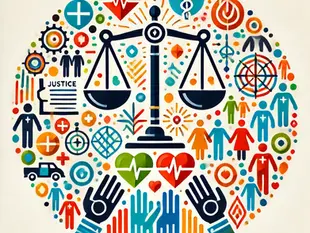I didn’t grow up thinking much about angels. At least not seriously. In the churches I knew as a child, angels were either characters in the Christmas pageant or celestial enforcers for a God who was keeping score. I saw the pictures: tall, white, winged men with flowing robes and swords or trumpets. But as I got older - and especially as I began to untangle the fear-based theology of our culture - I realized that those images, though familiar, weren’t the whole story. Not even close.
Today, I still believe in angels. But not the way I used to.

As a progressive Christian, my understanding of angels has evolved alongside my view of God, scripture, and the soul’s journey. I no longer see angels as divine puppets swooping down to micromanage our lives. Nor do I think of them as distant, ethereal figures who only show up for the saintly. Instead, I’ve come to understand angels as expressions of God’s presence, love, and guidance - appearing in our lives in ways both subtle and profound.
Angels as Messengers, Not Mascots
In scripture, angels are often described with one primary purpose: to deliver a message. That’s what the word angelos means in Greek - messenger. Gabriel delivers news to Mary. Angels appear to shepherds in the night. They show up to warn Joseph, comfort Jesus, strengthen the fearful, and call people into holy action.
What strikes me in these stories isn’t just the supernatural awe of it all. It’s the intimacy. Angels come to people when they are afraid. When they are unsure. When they are on the brink of something terrifying or transformative. In every case, the angel’s first words are the same: “Do not be afraid.”
That sounds less like mythology to me, and more like what God does every time we find ourselves face-to-face with something bigger than we can handle.
Angels as Archetypes of the Sacred
In my own spiritual journey, I’ve come to embrace not just theological insight but psychological and archetypal language. Carl Jung believed that certain spiritual realities- like angels - live not just out there in the cosmos but also within the psyche. That doesn’t mean they aren’t real. It means they’re deeply real—real in the ways that matter most.
From that perspective, angels can be understood as manifestations of the sacred breaking into consciousness - a still small voice, a deep knowing, an overwhelming peace, or the appearance of someone at just the right time with just the right words. These moments might not be as dramatic as a burning bush or a heavenly choir, but they can shake us just the same. They remind us that we are not alone.
And sometimes, that reminder is enough to change everything.
Angels Among Us
One of my favorite verses in the Bible is Hebrews 13:2: “Do not neglect to show hospitality to strangers, for by doing that some have entertained angels without knowing it.”
It’s not just a poetic idea—it’s a radical one. What if angels are not always supernatural beings with wings and haloes, but people in our lives who show up as bearers of grace? What if the person who comforted you when you were breaking down, or the friend who called out of nowhere just when you needed them, or the stranger who offered you kindness without agenda—what if they were the face of the divine?
I’ve come to believe that angels walk among us, and that most of the time, they look like ordinary people doing extraordinary things. Or perhaps ordinary things with extraordinary love. They show up in hospital rooms, in recovery meetings, at gravesides, in coffee shops, and sometimes even in mirrors when we’ve learned to offer grace to ourselves.
They show up not because we’ve earned them, but because God is a God who shows up—often in ways we don’t expect.
The Comfort of Mystery
I don’t claim to understand everything about angels. In fact, the older I get, the more I’m comfortable not knowing. There’s something sacred in that mystery. I don’t need to catalog celestial hierarchies or debate how many angels can dance on the head of a pin. I’d rather ask: Have you ever felt protected for no reason? Ever experienced peace when none should have been there? Ever looked back and realized someone stepped into your life, changed your path, and then disappeared?
I have.
And I’ve come to believe that even when we don’t have words for it, even when we aren’t sure what’s happening, God is present in ways that defy logic but speak directly to the heart.
Why It Matters
Our theology of angels isn’t just about what we believe—it’s about how we live. If we see angels as symbols of God’s care, then we live with more hope. If we believe angels appear in the form of others, then we learn to treat every person with reverence, just in case. If we believe that we, too, can be angels to one another, then we live more courageously, more compassionately, more purposefully.
And if we trust that God’s presence is always nearer than we think, then we don’t have to live in fear.
Final Thoughts
I still love a good angel story. I still light up at the image of Gabriel’s annunciation or the heavenly host singing over the shepherds. But today, angels are more than just characters to me. They are part of the great unfolding mystery of a God who never leaves us, who sends comfort and courage in a thousand unexpected ways.
You don’t have to see wings to know that angels are real.
You just have to pay attention.





